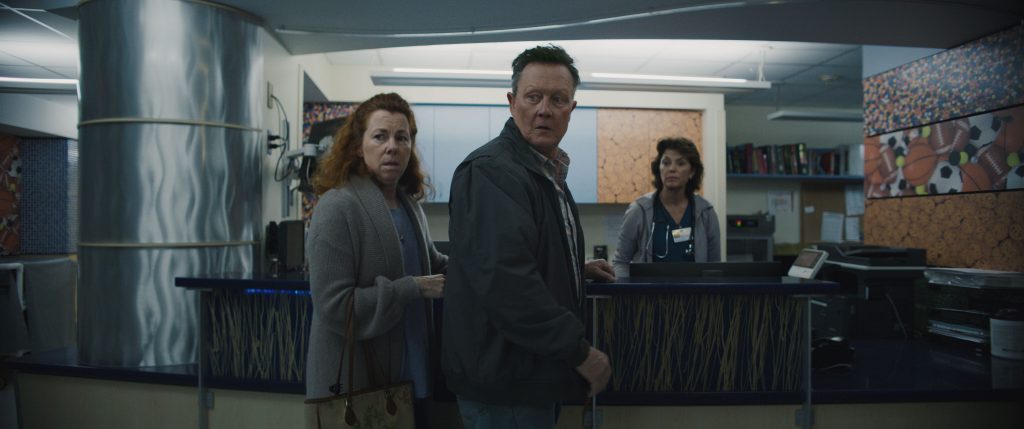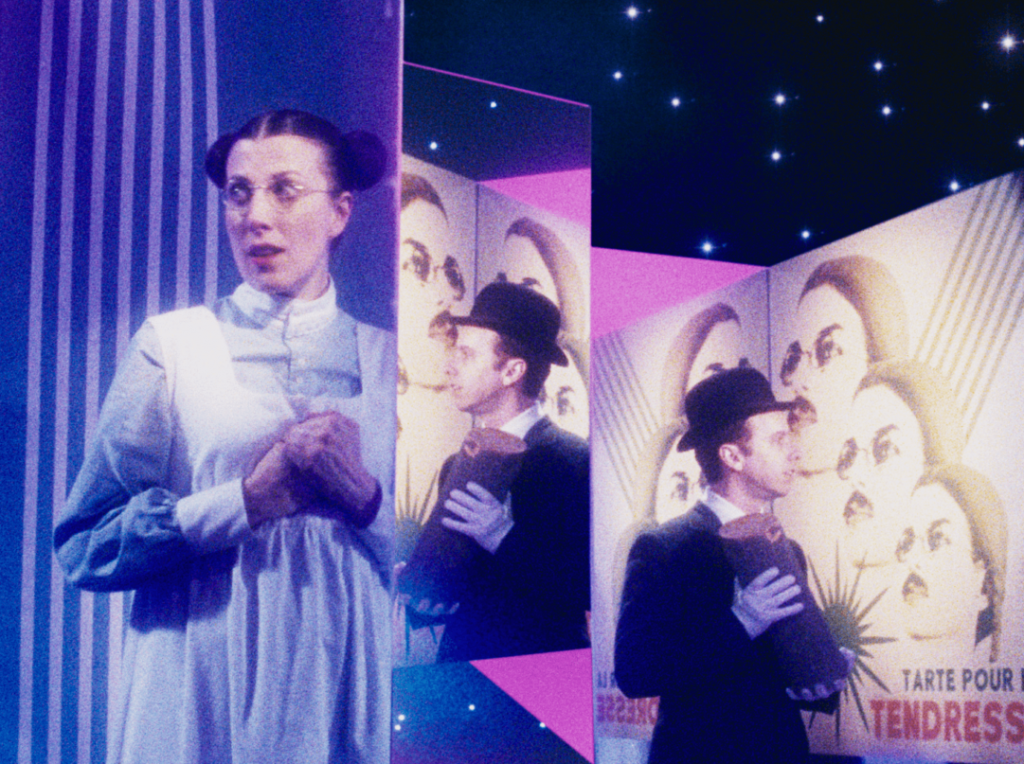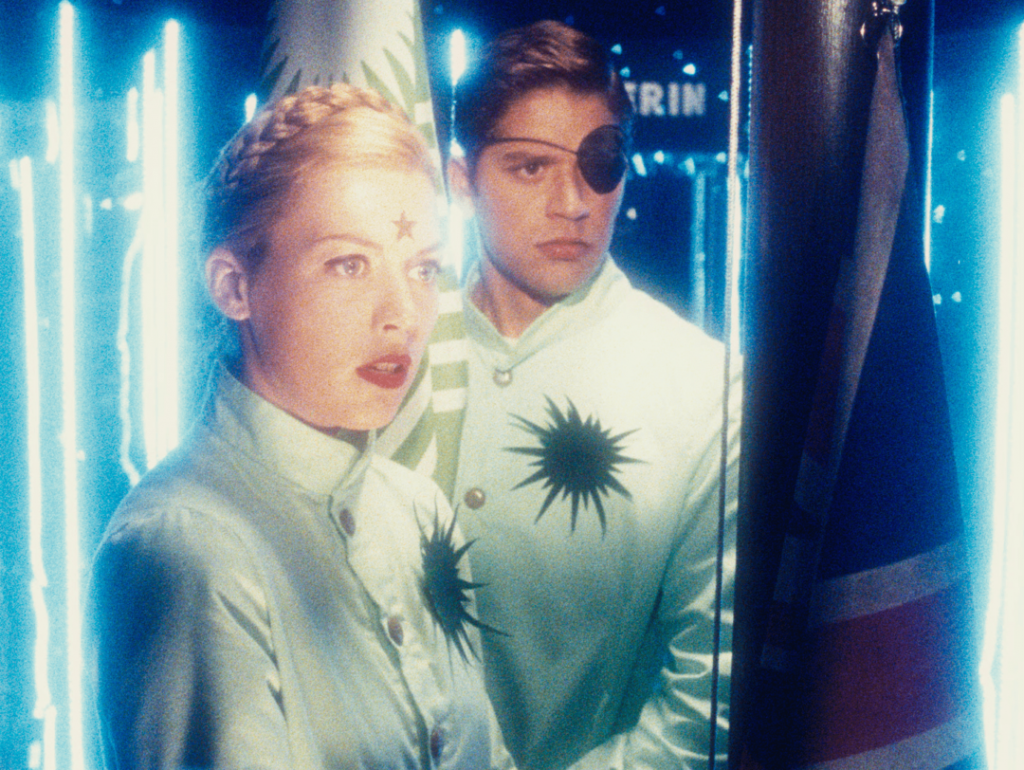September 7, 2021
by Carla Hay

Directed by Vibeke Muasya
Culture Representation: Taking place in upstate New York and other parts of the United States, the dramatic film “Rushed” features a predominantly white group of people (with some African Americans and Latinos) representing the working-class, middle-class and wealthy.
Culture Clash: After her teenage son dies during a college fraternity hazing party where he was forced to drink too much drug-laced alcohol, a grieving mother goes on a cross-country trip to interview other mothers who lost their sons in similar incidents, so that she can convince politicians to change the laws for fraternity hazing.
Culture Audience: “Rushed” will appeal primarily to people who are interested in movies about avenging parents and criminal justice, and are open to stories that don’t follow the usual clichés.

Although it will make many viewers uncomfortable, “Rushed” succeeds in its aim to not be a stereotypical movie about a mother trying to seek justice for her child who died an unnecessary and tragic death. “Rushed” starts out one way and it ends in an entirely different way. Viewers will either like or dislike the plot twist, but one thing that viewers can agree on is that is “Rushed” offers a very unsettling but realistic portrait of how grief can affect people in different ways.
Directed with simmering tension by Vibeke Muasya, “Rushed” features a memorable performance by Siobhan Fallon Hogan, who wrote the “Rushed” screenplay. The movie isn’t perfect, but the emotions and characters’ personalities seem very true-to-life. It’s very much meant to be a film where a lot of viewers can relate to at least one of the characters.
Hogan portrays Barbara O’Brien, a seemingly average middle-aged, middle-class homemaker who lives in upstate New York. Barbara and her husband Jim O’Brien (played by Robert Patrick) have four teenage children. Oldest child Jimmy (played by Jay Jay Warren) is 18 or 19 and in his first year at the fictional New York State University, where he lives on campus during the school year. The other three children live at home with the parents: daughter Ciara (played by Ellie Frankel), who’s about 16; daughter Kelly (played by Lily Rosenthal), who’s about 15; and son Sean (played by Liam Hogan), who’s about 13.
The O’Briens are a tight-knit Irish American Catholic family. Barbara is so religious that she prays every day with a rosary, and she keeps a statue of St. Augustine in the kitchen, where she prays next to the statue with a lighted candle on a regular basis. Even though chain-smoking Barbara (who is a homemaker) is a devout Catholic, she has some contradictions because she also frequently curses, which is against her religious beliefs. Her kids like to tease her about this dichotomous side to her personality.
Barbara is kind of a scatterbrain who has a tendency to talk out loud to herself. She’s always on the go and is at the center of all the organizing in this busy household. For the kids who live at home, Barbara is the one who usually makes sure that they are awake in time in the morning so they won’t be late for school. She makes everyone’s meals, and she drives the children to school and picks them up when school is done for the day. The kids who live at home go to a Catholic school where they have to wear school uniforms.
As for Jimmy, living away from home for the first time has given him more freedom but has also put him at risk for more danger. He’s decided to pledge the same fraternity that his father pledged when his father was a university student. The opening scene of “Rushed” foreshadows how brutal things will get during the hazing process that is ruled over by the current fraternity members and their president. The pledges, including Jimmy, are led into in a secluded wooded area at night, and they are forced to drink liquor while blindfolded. Then, the fraternity members abandon the pledges in the woods, thereby forcing the pledges to find their own way back home.
Hazing for fraternities and sororities usually involves pledges having to endure humiliating and painful acts. It’s an initiation process that’s supposed to make the pledges “prove” how badly they want to be in the fraternity or sorority. However, hazing (which often involves alcohol and/or other drugs) can sometimes go too far. College hazing incidents that have resulted in people dying almost always happen with fraternities.
After the abandonment in the woods, Jimmy and the other pledges endure more hazing, such as having to crawl on broken glass and the fraternity members urinating on them, while everything is being filmed on frat members’ phones. Presiding over these abusive acts is fraternity president Steven Croission (played by Jake Weary), who is a sadistic bully who loves to dole out as much suffering as he can. Steven is also on a power trip because he thinks he can get away with whatever he wants to do.
Steven can see that Jimmy isn’t afraid to stand up to Steven, so Steven has targeted Jimmy to get the worst of the hazing. After being urinated on, Jimmy is furious and is close to quitting the pledging process. However, Jimmy’s nerdy and empathetic roommate Vergil (played by Justin Linville), who is also Jimmy’s best friend at school, is pledging the same fraternity and doesn’t want to feel all alone in the pledging process. Vergil convinces Jimmy not to quit because the pledging process will be over soon.
The day after the Jimmy almost quit pledging the fraternity, Barbara calls to check in on Jimmy while she’s driving Ciara and Kelly to school. Jimmy pretends to everyone that everything is going well for him at school. He gives absolutely no indication that the fraternity hazing is abusive, and he doesn’t mention the bloody injuries he sustained from crawling on broken glass.
The pledging process soon ends. Jimmy and Vergil and some other pledges find out that they’ve been accepted into the fraternity. To welcome their new members, the fraternity has a big party at the frat house. Steven is seen buying cocaine and Xanax from a drug dealer. This loathsome fraternity president hasn’t forgotten Jimmy’s “insubordination,” so he plans to get revenge on Jimmy.
In order to prevent certain people from filming what he plans to happen, Steven makes sure that certain people’s phones are confiscated when they first enter the party. Vergil and Jimmy are among those whose phones are taken away. They’re told that they will get their phones back when they leave the party.
At the party, Jimmy is drinking alcohol moderately and not doing any drugs. However, it isn’t long before Steven puts his plan into action. He spikes a beer with a combination of cocaine and Xanax. And then he cheerfully gives the beer to Jimmy, who drinks it and almost immediately vomits.
Things quickly spiral out of control from there. As a “prank,” Steven has ordered his fraternity underlings to duct tape Jimmy to a chair, where Jimmy is force-fed alcohol until he loses consciousness. Vergil desperately pleads to get his phone back so he can call for help, but Steven refuses. Everyone else at the party thinks what’s being done to Jimmy is hilarious because Steven makes it look like it’s “all in good fun.”
You know what happens next: Jimmy really isn’t okay. Only after Steven sees that Jimmy might be in a coma does he allow Vergil to have his phone back. Vergil calls 911, an ambulance arrives, and Jimmy never regains consciousness. Because the medical diagnosis is that he’s brain dead and will never be conscious again, his family makes the difficult decision to take him off of life support.
All of this is not spoiler information because it’s in the trailer for “Rushed,” and Jimmy death serves as the catalyst for what happens in the rest of the movie. The O’Brien family is devastated, with Barbara taking it the hardest. While her husband eventually goes back to work and the other kids go back to school, she spends her days and nights chain-smoking and hunched on the couch in a deep depression where she barely talks to anyone.
And the O’Briens get more bad news when they find out that separate investigations conducted by the police and by the university concluded that Jimmy death was an accident of his own doing. Barbara is outraged because she’s sure that Jimmy wouldn’t have consumed all of that alcohol willingly. Her husband Jim accepts the findings though and tells Barbara that they need to move on.
But one day, something happens that snaps Barbara out of her bleak existence. She sees a news article on the Internet about a college student who also died during a fraternity hazing incident. It leads her to start doing more research on the Internet. And she’s shocked to see how many other young men died in ways that were similar to how Jimmy died, with no one being held accountable except for the dead guys who were blamed for their own deaths.
This information fuels an outrage that motivates Barbara to do something to change the existing laws about fraternity hazing. It just so happens that Jim has a fraternity brother who is now a U.S. senator. His name is Senator Bob Daley (played by Jordan Lage), who takes Jim’s call when Jim tracks down the senator’s phone number.
Barbara talks to Senator Daley too. And he seems very sympathetic about the O’Briens’ tragic loss. The senator says he would like to help in any way that he can. Barbara says that she’ll take him up on his offer. And she’s got an idea that she thinks will help convince politicians to make a law against hazing.
Barbara decides go on a cross-country trip by car, to videorecord interviews that she conducts with parents (mostly mothers) who also lost their sons to university hazing incidents. It’s not an easy task, since many are reluctant to talk on camera. However, she usually gets the mothers to open up because she knows exactly how they feel.
Most of the parents are working-class and middle-class. However, two parents whom Barbara visits are wealthy. There’s a somewhat amusing part of the movie where Barbara just can’t get over how big this couple’s mansion is and she gushes about it on the phone to Jim. It’s a very realistic and funny scene.
The wealthy couple are not identified by their first names in the movie. They are called Mr. Donohue (played by Sean Cullen) and Mrs. Donohue (played by Peri Gilpin), who have very different views on their son’s death. Mr. Donohue is a member of the fraternity that his son was pledging, so he’s inclined to think it was a tragic accident. Mrs. Donohue is fairly certain that her son died of manslaughter or negligence. She agrees to make a statement on video, while her husband refuses.
The last third of the movie takes a very dark turn that might surprise a lot of viewers. However, there were signs that some of the extreme things that happen didn’t come from out of the blue. The impact of this movie rests on the ability to convince viewers that what happens in this plot twist could very well happen in real life. Muasya steers this movie in a way that will catch people off guard, just like Barbara’s life takes some twists and turns that she never imagined before Jimmy died.
Hogan’s portrayal of Barbara is heart-wrenching, but the movie doesn’t make her out to be a confident crusader who knows what she’s doing. If she’s flying blind into her mission, it’s because she’s blind from grief that won’t go away, no matter how many therapeutic interviews she does with parents who’ve lost a child in similar ways. Viewers might wonder why Barbara is willing to suddenly up and leave her family to take this road trip, but it’s a compulsion, just like her devotion to religious rituals, that’s very consistent with her personality.
If you’re looking for a formulaic TV-movie-of-the week conclusion to this story, you’ll have to look elswhere. “Rushed” is not going to give easy and trite answers to a very complex problem. The movie serves as a striking example of how even though people involved in hazing deaths often deny responsibility, the damage is felt in one way or another by those who were left behind.
Vertical Entertainment released “Rushed” in select U.S. cinemas, on digital and VOD on August 27, 2021.


